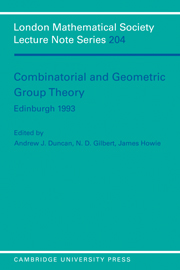Book contents
- Frontmatter
- Contents
- Foreword
- Participants
- On bounded languages and the geometry of nilpotent groups
- Finitely presented groups and the finite generation of exterior powers
- Semigroup presentations and minimal ideals
- Generalised trees and Λ-trees
- The mathematician who had little wisdom: a story and some mathematics
- Palindromic automorphisms of free groups
- A Freiheitssatz for certain one-relator amalgamated products
- Isoperimetric functions of groups and exotic cohomology
- Some embedding theorems and undecidability questions for groups
- Some results on bounded cohomology
- On perfect subgroups of one-relator groups
- Weight tests and hyperbolic groups
- A non-residually finite, relatively finitely presented group in the variety N2A
- Hierarchical decompositions, generalized Tate cohomology, and groups of type (FP)∞
- Tree-lattices and lattices in Lie groups
- Generalisations of Fibonacci numbers, groups and manifolds
- Knotted surfaces in the 4-sphere with no minimal Seifert manifolds
- The higher geometric invariants of modules over Noetherian group rings
- On calculation of width in free groups
- Hilbert modular groups and isoperimetric inequalities
- On systems of equations in free groups
- Cogrowth and essentiality in groups and algebras
- Regular geodesic languages for 2-step nilpotent groups
- Finding indivisible Nielsen paths for a train track map
- More on Burnside's problem
- Problem Session
Problem Session
Published online by Cambridge University Press: 05 April 2013
- Frontmatter
- Contents
- Foreword
- Participants
- On bounded languages and the geometry of nilpotent groups
- Finitely presented groups and the finite generation of exterior powers
- Semigroup presentations and minimal ideals
- Generalised trees and Λ-trees
- The mathematician who had little wisdom: a story and some mathematics
- Palindromic automorphisms of free groups
- A Freiheitssatz for certain one-relator amalgamated products
- Isoperimetric functions of groups and exotic cohomology
- Some embedding theorems and undecidability questions for groups
- Some results on bounded cohomology
- On perfect subgroups of one-relator groups
- Weight tests and hyperbolic groups
- A non-residually finite, relatively finitely presented group in the variety N2A
- Hierarchical decompositions, generalized Tate cohomology, and groups of type (FP)∞
- Tree-lattices and lattices in Lie groups
- Generalisations of Fibonacci numbers, groups and manifolds
- Knotted surfaces in the 4-sphere with no minimal Seifert manifolds
- The higher geometric invariants of modules over Noetherian group rings
- On calculation of width in free groups
- Hilbert modular groups and isoperimetric inequalities
- On systems of equations in free groups
- Cogrowth and essentiality in groups and algebras
- Regular geodesic languages for 2-step nilpotent groups
- Finding indivisible Nielsen paths for a train track map
- More on Burnside's problem
- Problem Session
Summary
Problem 1 [I.M. Chiswell] A group G is n-residually free if, given any n non-trivial elements g1,…, gn of G, there exists a homomorphism ϕ: G → F to a free group F such that ϕ(gi) ≠ 1 for i = 1, …, n. A group G is fully residually free if it is n-residually free for all n. Finitely generated surface groups are fully residually free. Does there exist a finitely generated fully residually free group which is not finitely presented?
Problem 2 [I.M. Chiswell] Let Λ be a totally ordered abelian group. A group G is Λ-free if it has a free action on some Λ-tree, and G is tree-free if it is Λ-free for some Λ. If G is a finitely generated tree-free group, does G act freely on some AΛ-tree with A finitely generated?
This is true if G is fully residually free (see problem 1) (Remeslennikov). Not all tree-free groups are fully residually free: there are counterexamples due to D. Spellman.
Problem 3 [D.E. Cohen] For what meanings of “nice” is a graph product of nice groups nice?
Hermiller has shown that one “nice” property is that of having a finite, complete rewriting system. Baik, Howie and Pride (J. Algebra 162 (1993) 168-77) show that FP3 is a “nice” property, whilst Harlander and Meinert have shown that FPm is a “nice” property.
- Type
- Chapter
- Information
- Combinatorial and Geometric Group Theory, Edinburgh 1993 , pp. 322 - 325Publisher: Cambridge University PressPrint publication year: 1994



